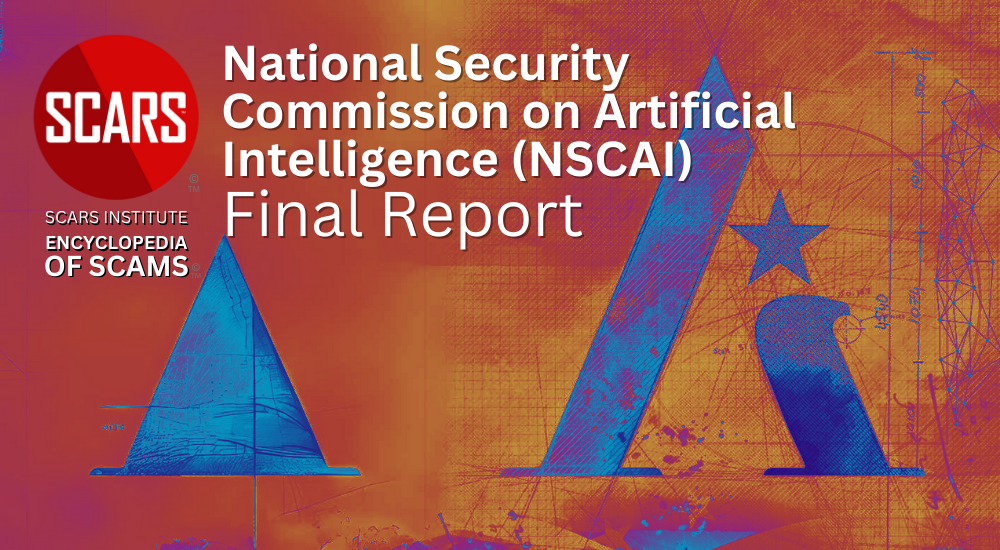
SCARS Institute’s Encyclopedia of Scams™ Published Continuously for 25 Years

Danielle Delaunay – An Analysis of Her Value to Romance Scammers
A SCARS Institute Analysis of Why Danielle Delaunay’s Photos Have Been Continuously Used for More than a Decade by Romance Scammers to Scam Men!
Scam Victim Targeting Analysis – A SCARS Institute Insight
Author:
• Tim McGuinness, Ph.D., DFin, MCPO, MAnth – Anthropologist, Scientist, Director of the Society of Citizens Against Relationship Scams Inc.
Article Abstract
Danielle Delaunay’s stolen images have been used for over a decade in romance scams, attracting male victims due to her approachable beauty, warmth, and perceived trustworthiness. Her likeness is ideal for scammers because it taps into several psychological factors: the halo effect, where her attractiveness leads victims to assume other positive traits like kindness; and emotional manipulation, as her images project an accessible, caring persona that fills emotional voids in lonely or vulnerable men.
The scammers exploit these factors to create deep emotional bonds, playing into victims’ fantasies, and making it difficult for them to let go, even when red flags arise. Additionally, cognitive biases like confirmation bias and the sunk cost fallacy make it harder for victims to break free from the scam. For men emotionally invested in these scams, it is crucial to present evidence gently, offer empathy, and explain common scam tactics. Helping them understand the manipulation they’ve faced is the first step toward recovery.

A SCARS Institute Analysis of Why Danielle Delaunay’s Photos Have Been Continuously Used for More than a Decade by Romance Scammers to Scam Men!
Why have the photos and identity of Danielle Delaunay been so commonly used by romance scammers for more than a decade? It’s important to explore the psychological values that make her images especially alluring and attractive to typical male scam victims.
Romance Scammers understand the psychological factors that drive attraction and use them to lure, groom, and manipulate victims emotionally.
Danielle Delaunay – Archetype Romance Scam Identity
Here’s an overview of our analysis of these deeper psychological values:
Approachability and Relatability
One of the key psychological elements that makes Delaunay’s appearance effective in romance scams is her perceived approachability. She is attractive but not overly intimidating, with a look that blends both sophistication and warmth. This makes male victims feel that she is someone they could realistically have a relationship with. Men who might feel out of place interacting with highly glamorous, distant, or celebrity-like women often find her more relatable. Scammers exploit this perception, as men are more likely to invest emotionally in someone who feels “attainable.”
Feminine Softness
Delaunay’s physical appearance conveys a softness and femininity, which many male scam victims find appealing. Her facial expressions in the photos often project gentleness, kindness, and warmth—qualities that draw men in, particularly those who are seeking emotional connection or a nurturing partner. Scammers rely on this to establish an initial emotional bond with the victim, making them feel safe and cared for.
Trustworthiness and Innocence
Delaunay’s photos often feature her smiling or in casual, natural poses, which conveys a sense of trustworthiness and innocence. For men who may be lonely or emotionally vulnerable, this trust factor is key. Scammers know that by using her image, they can create an illusion of a trustworthy, wholesome woman who is sincere and genuine. This allows them to more easily manipulate victims into developing an emotional connection and eventually exploit that trust for financial gain.
The Idealized Partner
Delaunay’s images can be molded into the “ideal partner” for many men. She fits into an idealized version of femininity that many victims may aspire to find—beautiful yet down-to-earth, seemingly independent yet approachable, stylish yet relatable. Scammers are adept at leveraging these characteristics to mirror the desires of their target victims, crafting a narrative that aligns with the man’s romantic fantasies. This can be particularly powerful when victims are lonely or struggling with real-life relationships, as the woman in the photos appears to fulfill the emotional gaps in their lives.
Exclusivity and Special Attention
The use of a model’s photos like Delaunay’s also plays into the male fantasy of receiving special attention from an attractive woman. Victims are led to believe that this beautiful woman, despite her physical attractiveness and supposed success, has taken an interest in them specifically. This strokes the ego and builds a sense of exclusivity, making the victim feel chosen and valued. Scammers know how to nurture this feeling to deepen the emotional attachment and increase the likelihood of financial exploitation.
The Power of a Genuine Smile
In psychology, a genuine smile is often considered one of the most attractive and disarming features. Delaunay’s photos frequently showcase her smiling, which subconsciously encourages feelings of happiness and comfort in the viewer. Scammers use these psychological triggers to make the victim associate the person in the images with positive emotions, building a foundation of trust. This emotional manipulation is key to romance scams, as it makes victims feel more connected to the persona being projected.
Filling Emotional Voids
Many male romance scam victims are often lonely, emotionally vulnerable, or have unmet emotional needs. Delaunay’s images, when combined with the scammer’s sweet words and fake personality, tap into these emotional voids. The image of an attractive, caring, and seemingly “perfect” woman gives victims a sense of validation, fulfilling their desire for companionship, affection, and attention. Scammers craft their stories around the emotional needs of the victims, using Delaunay’s appealing and approachable face to keep them hooked.
A Blend of Beauty and Normalcy
While Delaunay is clearly beautiful, she also appears “normal” enough to seem like a realistic romantic partner to many men. Unlike using the image of a supermodel or a global celebrity, scammers can use her pictures without raising suspicion that the person is too good to be true. She represents an ideal balance—attractive enough to be desired, but normal enough to seem like a real woman who might be genuinely interested in the victim. This blend of beauty and believability is an effective psychological tool in the scam.
Nurturing Vulnerable Personalities
Romance scammers target individuals who may already be struggling with self-esteem issues or feelings of inadequacy, and Delaunay’s images provide an easy way to create an illusion of being cared for by someone who is outwardly perfect. Scammers use her likeness to create a fantasy relationship where the victim feels understood and supported. Victims who feel unappreciated in their personal lives are especially vulnerable to this manipulation, making the scam feel even more real and intimate.
The popularity of Danielle Delaunay’s stolen identity among scammers is not just about her physical beauty; it’s about the combination of factors that appeal to the emotions and psychological needs of typical male romance scam victims. Her approachable appearance, warmth, and perceived trustworthiness create a perfect storm of emotional manipulation. Scammers use these traits to establish a deep emotional connection with their targets, playing into the fantasies, insecurities, and desires of the victims to hold their attention and exploit them for financial gain. The psychological underpinnings of loneliness, vulnerability, and the need for validation make Delaunay’s image an especially powerful tool in romance scams.
See a Danielle Delaunay photo gallery here: https://romancescamsnow.com/dating-scams/know-your-enemy-do-you-know-this-girl-danielle-delaunay-is-an-favorite-of-african-scammers/
Underlying Psychological Biases
The attraction and manipulation of men by scammers using Danielle Delaunay’s stolen identity taps into several cognitive biases, logical fallacies, and psychological schemas. These mental shortcuts and flawed reasoning patterns make victims more susceptible to deception, leading them to make decisions and form emotional connections that they might otherwise avoid.
Here’s our analysis of some of these mechanisms:
Cognitive Biases
Halo Effect
The halo effect occurs when the perception of one positive trait (such as physical attractiveness) influences the perception of other traits. In the case of Delaunay’s stolen identity, men may assume that because the woman in the photos is attractive, she is also kind, trustworthy, and intelligent. This bias leads to an overall positive judgment of the person based solely on appearance, allowing scammers to manipulate the victim’s emotions more easily.
Confirmation Bias
Victims of romance scams often experience confirmation bias, where they seek out information or interpret ambiguous signals in a way that confirms their existing beliefs. For example, once a man becomes emotionally invested in the persona crafted by the scammer, he may ignore or rationalize warning signs that contradict the idealized image he has formed. This bias makes it easier for scammers to maintain their deception over time, as the victim will overlook inconsistencies in favor of maintaining the emotional bond.
Sunk Cost Fallacy
The sunk cost fallacy leads people to continue investing in a situation because they have already spent time, effort, or money on it, even when it is no longer rational to do so. In romance scams, men may be reluctant to disengage from the relationship because they’ve already invested significant emotional energy, time, or money. They believe that cutting ties would mean losing everything they’ve put into the relationship, making them more susceptible to ongoing manipulation.
Reciprocity Bias
The principle of reciprocity states that people feel obliged to return a favor or gift. Scammers often exploit this by showering the victim with compliments, affection, and attention early on. Victims feel emotionally indebted to reciprocate by continuing the relationship, offering financial help, or doing what the scammer asks. The psychological pressure to return the favor keeps the victim engaged, even when suspicions arise.
Optimism Bias
Optimism bias leads people to believe that they are less likely to experience negative outcomes compared to others. A man may think that scams happen to other people, not to him, because he sees himself as smarter or more careful. This bias causes victims to underestimate the likelihood of being scammed, even when they have been exposed to stories about scams or recognize some of the warning signs.
Authority Bias
Scammers often present themselves as being in authoritative or high-status roles (such as a doctor, soldier, or wealthy businesswoman). The use of Delaunay’s images, which often depict her in a polished and sophisticated manner, plays into authority bias. Men may be more willing to trust and believe someone who appears to have a high social standing or professional status, making it easier for scammers to manipulate their victims.
Logical Fallacies
Appeal to Emotion
Scammers frequently use emotional manipulation to exploit victims’ feelings of loneliness, sympathy, or desire for connection. The appeal to emotion fallacy occurs when scammers bypass logical reasoning by focusing solely on emotions. The person being deceived might feel intense affection, pity, or excitement, leading them to ignore any logical inconsistencies or red flags in the scammer’s behavior or story.
False Dichotomy
Scammers may create a sense of urgency or pressure by presenting the victim with a false dichotomy, framing their requests as an either-or situation: either the victim helps them financially or the relationship ends. This false dichotomy leads the victim to believe they have only two options, neither of which includes questioning the authenticity of the scammer. By limiting the perceived choices, scammers increase the pressure on victims to comply.
Appeal to Authority
When scammers use Delaunay’s image or portray themselves as a professional, they may invoke the appeal to authority fallacy. They rely on the victim’s respect for perceived authority figures, like someone who looks professional or successful, to justify their requests for help or money. Victims might comply because they feel they are dealing with someone knowledgeable or in a high-status role.
Bandwagon Fallacy
Scammers might imply that their “love” or relationship with the victim is progressing just as a normal relationship would, encouraging the victim to conform to perceived social norms. Victims may fall prey to the bandwagon fallacy, believing that because other people find partners online or in long-distance relationships, it’s perfectly reasonable for them to do the same without questioning authenticity.
Psychological Schemas
Romantic Fantasy Schema
Many victims, particularly those who feel lonely or unfulfilled, may have a romantic fantasy schema that includes the belief that love should happen quickly, be overwhelming, and fulfill all emotional voids. Scammers exploit this by offering a rapid, idealized romance that fulfills these expectations. They play into the victim’s desire for passion, making it easier to manipulate emotions and gain control of the relationship.
Rescuer Schema
Some men may have a rescuer schema, meaning they derive a sense of purpose or self-worth from helping others in need. Scammers often craft stories in which they are in dire circumstances, requiring the victim’s financial assistance or emotional support. This plays into the rescuer schema, as the victim feels needed and important, driving them to continue helping even as the requests escalate.
Self-Worth and Validation Schema
Victims of romance scams are often individuals who crave validation and may have low self-esteem. The attention and affection given by the scammer, using Delaunay’s attractive images, provide a sense of worth and desirability. The scammer builds on this schema by constantly flattering the victim, making them feel important and attractive, thus reinforcing the emotional bond and making it harder for the victim to step away.
Scarcity Schema
The scarcity schema refers to the belief that good things are rare or fleeting. Scammers play into this by making the victim feel that the relationship is a rare, once-in-a-lifetime opportunity that they must protect and nurture. The scammer may express that their love or attention is unique, causing the victim to invest more deeply in the relationship out of fear that they won’t find someone like this again.
Trust and Commitment Schema
For many men, the foundation of trust is crucial in any relationship. Scammers carefully build trust by engaging the victim in meaningful conversations, sharing “personal” details, and creating a narrative of commitment. Once the victim’s trust schema is activated, they may be more likely to ignore contradictory evidence or suspicions because their commitment to the relationship has been solidified.
The psychological manipulation of men in romance scams is a complex process involving various cognitive biases, logical fallacies, and psychological schemas. Scammers carefully exploit these mental patterns using stolen images like those of Danielle Delaunay to create an illusion of love, trust, and emotional connection. By leveraging cognitive biases like the halo effect, confirmation bias, and the sunk cost fallacy, along with playing into logical fallacies such as appeals to emotion and false dichotomies, scammers manipulate their victims into a web of deception. The psychological schemas of romantic fantasies, rescuing, and the need for validation further trap victims, making it harder for them to recognize the manipulation and exit the fraudulent relationship. Understanding these mental mechanisms is key to both preventing and educating individuals about the dangers of romance scams.
The White Knight Syndrome
“White Knight Syndrome” can play a significant role in how men are manipulated in romance scams, particularly when scammers use the stolen identity of someone like Danielle Delaunay. White Knight Syndrome refers to a psychological need, often found in men, to rescue or protect others—especially women—who are perceived as being in distress. Men with this syndrome tend to derive self-worth and fulfillment from saving someone they believe to be vulnerable or in trouble.
Here’s how the White Knight Syndrome can factor into romance scams:
Playing on the Need to Rescue
Scammers frequently create elaborate backstories where they pose as someone in dire need of help, such as being stranded in a foreign country, needing money for medical expenses, or facing some form of personal crisis. These stories are designed to activate the White Knight Syndrome in men who feel compelled to come to the rescue of a woman in need. By using Danielle Delaunay’s images—of an attractive and approachable woman—scammers create the illusion that this “damsel in distress” is someone worth protecting.
Emotional Fulfillment Through Helping
For men with White Knight Syndrome, the act of rescuing or providing for someone gives them a sense of purpose and emotional validation. Scammers tap into this by continuously feeding the victim with requests for assistance, whether financial, emotional, or logistical. Each time the victim complies, it reinforces the belief that they are helping someone they care about, fulfilling their desire to be the hero in the situation. This makes it difficult for them to step back, even when red flags start to appear because they have tied their emotional fulfillment to the role of the protector.
Building a Deep Emotional Bond
Men with White Knight Syndrome often feel a deep emotional connection to the person they are “rescuing.” Scammers take advantage of this by showering the victim with gratitude and affection, reinforcing the bond. The scammer might say things like, “I don’t know what I would do without you,” or “You’re the only one I can trust.” This emotional manipulation taps into the victim’s need to feel important and valued, deepening their involvement in the relationship and making it harder for them to see the deception.
Vulnerability to Manipulation
White Knight Syndrome can make men more vulnerable to manipulation because they tend to ignore the logical aspects of a situation in favor of their emotional need to help. Scammers know that men with this mindset are likely to overlook inconsistencies in their stories or any warning signs that would normally cause suspicion. The strong desire to protect overrides critical thinking, allowing scammers to continue their deception for longer periods of time without being questioned.
Feeling Trapped by Duty
Once a man with White Knight Syndrome has invested in the relationship—emotionally, financially, or both—he may feel trapped by a sense of duty. Scammers exploit this by escalating their needs or crises, making the victim feel that walking away would mean abandoning someone who is truly reliant on them. The man may feel that without his support, the woman (the scammer’s fake persona) will suffer, increasing his sense of obligation and deepening his entanglement in the scam.
Reinforcement of Gender Roles
White Knight Syndrome is often tied to traditional gender roles, where men see themselves as protectors and providers. Scammers exploit these roles by creating situations in which the woman appears vulnerable and dependent on male assistance. The victim, viewing himself as the protector, feels compelled to step in and “save” the woman, reinforcing this traditional role. Scammers understand this dynamic and use it to manipulate men into providing money or personal information under the guise of helping someone in distress.
White Knight Syndrome plays a powerful role in romance scams, particularly when scammers use images of women like Danielle Delaunay to craft an appealing and emotionally charged narrative. Men with this syndrome are more likely to fall into the trap of feeling they need to rescue or protect someone, and scammers skillfully manipulate this desire to maintain control over the victim. By continuously feeding into the victim’s need to be the hero and emotionally reinforcing their actions, scammers can sustain the scam over long periods, extracting significant financial or personal gain from the victim. Understanding the role of White Knight Syndrome is crucial for both preventing such scams and providing support to those who have become victims.
But Again, Why Danielle Delaunay?
Danielle Delaunay’s stolen images play a significant role in why men find it so difficult to break free from the lies and fantasies spun by scammers. Several factors about her appearance, combined with psychological dynamics and the crafted narratives around the scams, make it particularly challenging for men to detach from the deception.
Here’s a breakdown of these elements:
Physical Attractiveness and Idealization
Delaunay’s images show an attractive, approachable woman who fits a common fantasy of beauty without being overly glamorous or intimidating. This creates an idealized version of a romantic partner in the minds of the victims. Her beauty makes it easy for men to overlook inconsistencies or doubts because they become emotionally invested in the fantasy of having a relationship with someone they find physically appealing. The images fuel their desire, making the scammer’s false persona feel more real and harder to question.
Perceived Authenticity
Her photos are often casual and natural, portraying her as someone authentic and genuine, rather than a distant or unattainable model. This gives the scam more credibility because victims see her as “real” and relatable. Scammers use these photos to build a persona that seems down-to-earth and emotionally accessible, which can lower the victim’s defenses and increase their willingness to trust the narrative.
Emotional Attachment
Scammers using Delaunay’s images are skilled at creating a deep emotional bond between the victim and the fake persona. The combination of her appearance and the scammer’s emotional manipulation makes men feel that they are in a genuine romantic relationship. Once emotions are involved, it becomes significantly harder for victims to see the truth. The emotional investment, coupled with the scammer’s continuous expressions of love and gratitude, creates a powerful attachment that makes breaking away feel like a loss of a real relationship.
The Fantasy of Being Desired
For many victims, particularly those who are lonely or feel inadequate in their real-life relationships, the scam feeds into a powerful fantasy: being desired by a beautiful woman. Delaunay’s images embody that fantasy, and the scammer’s manipulation reinforces the idea that this attractive woman is genuinely interested in them. The validation they receive from the persona—whether it’s through affectionate messages, compliments, or attention—fills an emotional void, making it incredibly difficult for victims to give up that sense of being desired, even when doubts arise.
Reinforcement of Emotional Dependency
Scammers often create scenarios where the fake persona seems emotionally dependent on the victim. They might express gratitude for the victim’s support, claim they have no one else to turn to, or even suggest they are in love. This emotional dependency makes the victim feel needed and responsible for the other person’s well-being. In turn, it becomes harder for them to break free because they fear abandoning someone they believe cares for them and relies on their help.
Manipulation of Trust
The scammers use Delaunay’s approachable and trustworthy appearance to build a narrative of loyalty and honesty. Victims are led to believe that they are the only one the scammer trusts and confides in, deepening the emotional connection. Once trust is established, the victim’s critical thinking is diminished, and they’re more likely to ignore red flags. The illusion of trust makes it even harder for men to disentangle themselves from the deception, as they have been manipulated to believe in the sincerity of the relationship.
Fear of Being Wrong
Victims often hesitate to acknowledge the possibility of being scammed because admitting they’ve been deceived can be painful and humiliating. This fear of embarrassment or the stigma associated with being tricked causes them to cling to the fantasy rather than confront reality. The more emotionally invested they are, the harder it is to accept that the person they’ve been talking to is not real. Delaunay’s images serve as a convincing visual anchor for the persona, making it easier for victims to rationalize away inconsistencies and continue believing in the relationship.
The Illusion of Progress
Scammers frequently use techniques to make the relationship feel like it’s progressing—such as future promises, talk of meeting in person, or sharing details about a supposed life together. Delaunay’s images help reinforce this illusion because the victim sees a face they associate with these future plans. The idea that they are building something real and lasting with this person makes it harder to walk away. The fantasy of a future keeps victims emotionally locked in the relationship, even when the scam becomes evident to outsiders.
The Reinforcement of Masculine Roles
For men, the scam often plays into traditional masculine roles of being the protector, provider, and problem-solver. Scammers create situations where the victim feels like they are needed to “rescue” the woman from financial or emotional distress. Delaunay’s appearance—portrayed as approachable, feminine, and in need of help—amplifies this dynamic. Men who derive their sense of self-worth from fulfilling these roles feel compelled to stay in the relationship, even when doubts surface. Leaving the relationship would feel like abandoning their duty or failing in their role as a protector.
The Power of Visual Imagery
The human brain is wired to respond strongly to visual stimuli, and Delaunay’s images provide a tangible, visual anchor that scammers can use to solidify the fantasy. Seeing her face repeatedly in different contexts (casual photos, selfies, etc.) builds familiarity and trust, making the relationship feel more real than it actually is. The consistent use of her images keeps the victim’s imagination engaged, allowing the scammer to maintain control of the narrative. The power of visual reinforcement makes it difficult for victims to let go of the persona, as they feel they “know” the person they’re seeing in the photos.
The combination of Danielle Delaunay’s physical attractiveness, perceived authenticity, and the emotional manipulation employed by scammers creates a potent mix that makes it difficult for men to break free from the fantasy. The psychological attachment to being desired, the reinforcement of masculine roles, and the deep emotional bond formed during the scam all contribute to the victim’s reluctance to let go. The visual imagery of Delaunay’s likeness serves as a powerful anchor, tying the victim to the illusion and making it even harder to accept the truth. As a result, victims become emotionally trapped in the deception, finding it nearly impossible to sever the ties to the scam, even when presented with evidence of the fraud.
Helping Men Who Are Trapped
Helping a man see the reality that he has been talking to a scammer using stolen photos and a false identity can be a delicate process, particularly because of the deep emotional involvement and psychological manipulation he may have experienced.
Here are some of the most effective ways to guide him toward accepting the truth:
Approach with Empathy and Sincere Concern, Not Judgment
The man is likely already feeling vulnerable, and approaching him with accusations or judgment may cause him to shut down or become defensive. It’s important to come from a place of understanding and compassion. Acknowledge his feelings and the emotional bond he may have formed with the person he believes he has been talking to. Say things like, “I understand how real this feels to you” or “I know this is hard, but I want to help.”
Present Factual Evidence
Scammers rely on their victims staying emotionally invested and avoiding facts that contradict the illusion. Present clear, undeniable evidence that the identity is fake. This can include:
-
-
- Reverse Image Searches: Show him how to use a reverse image search tool (e.g., Google Images or TinEye) to find out where the photos come from. When he sees that the images are widely used across scam reports or associated with other names, it’s often a powerful moment of realization.
- Known Scam Reports: Share links to credible sources like scam reporting websites where the stolen identity is documented. If he sees the same images used in other scams, it can help him recognize that he is not the only one being deceived. Such as here: https://romancescamsnow.com/dating-scams/know-your-enemy-do-you-know-this-girl-danielle-delaunay-is-an-favorite-of-african-scammers/
- Inconsistencies in Communication: Point out inconsistencies in the scammer’s story, language, or behavior. If the person claims to be from one country but has poor language skills that don’t align with that origin, or if the story shifts frequently, those red flags can help him start questioning the narrative.
-
Explain the Common Techniques Used by Scammers
Educate him on how scammers operate and how they craft stories to manipulate emotions. Explain typical scam tactics, such as creating a false sense of urgency, asking for money under distressing circumstances, or mirroring emotional needs. When he understands that scammers are professionals at this manipulation and often use these techniques on many victims, it may help him detach from the idea that this was a unique and personal relationship.
Also, suggest questions that he needs to answer for himself.
Highlight the Emotional Manipulation
Gently point out the psychological tactics that may have been used to exploit his emotions. Explain cognitive biases like the “sunk cost fallacy” (where he feels compelled to continue because of the time and energy already invested) or “confirmation bias” (where he has subconsciously ignored red flags to maintain his belief in the relationship). Helping him recognize how his emotions were manipulated might allow him to view the situation more critically.
Use Real-Life Examples of Other Victims
Scammers rely on the fact that their victims often feel isolated and ashamed, making them believe they are alone in their experience. Share stories of other victims who have gone through similar situations. These real-life examples can help normalize his experience and remove the stigma or embarrassment of being scammed. It can also make the scam seem more believable when he realizes how common it is.
Have him watch this: https://youtu.be/4hBSKqsFJO0
Discuss the Psychological Impact of Scams
Sometimes it helps to focus not on the person he thinks he has been talking to but on how the scam has impacted him emotionally and financially. Gently discuss how the scam may have created stress, and anxiety, or led him to make decisions he wouldn’t normally make. Acknowledging the emotional manipulation can sometimes help him accept that the relationship wasn’t real.
Encourage a Slow Realization
Some victims may not be able to accept the truth immediately. It can be a painful and gradual process. Encourage him to take small steps to investigate the relationship further, like testing some of the scammer’s claims or seeking advice from trusted friends or professionals. Avoid pressuring him to accept everything at once, as the emotional connection he has built may take time to unravel.
Seek Support from Trusted Sources
If he struggles to accept the truth, suggest speaking with someone outside the situation, such as a counselor, therapist, or scam survivor support provider. Sometimes an impartial third party can help him come to terms with the reality in a non-threatening way. Organizations that focus on scam victim recovery, like the SCARS Institute, can offer community support and education, helping him realize that his experience is unfortunately common.
Focus on Financial Protection
In cases where the man has already been sending money to the scammer, frame the discussion around financial safety. Explain that even if he’s not yet emotionally ready to accept that this person isn’t real, it’s important to stop sending money to protect himself financially. This practical step can help break the cycle of ongoing victimization, which can eventually lead to emotional clarity.
Offer Ongoing Support
Helping someone accept they’ve been scammed is not a one-time conversation. It requires ongoing support. Reassure him that he’s not alone and that you’ll be there as he processes the situation. Let him know it’s okay to feel confused, hurt, or angry, and that accepting the truth doesn’t mean he’s foolish—just that he was taken advantage of by professionals who exploit emotions.
Conclusion
Helping a man realize that he has been deceived by a scammer using stolen photos, such as those of Danielle Delaunay, requires a combination of empathy, factual evidence, and psychological insight. The process must be handled with care, as the emotional bond he’s formed with the fake persona can be deeply ingrained. By guiding him gently, presenting clear evidence, and offering ongoing support, you can help him start to see the reality of the situation and take steps toward emotional and financial recovery.
More About Danielle Delaunay
A Note About Labeling!
We often use the term ‘scam victim’ in our articles, but this is a convenience to help those searching for information in search engines like Google. It is just a convenience and has no deeper meaning. If you have come through such an experience, YOU are a Survivor! It was not your fault. You are not alone! Axios!
Statement About Victim Blaming
SCARS Institute articles examine different aspects of the scam victim experience, as well as those who may have been secondary victims. This work focuses on understanding victimization through the science of victimology, including common psychological and behavioral responses. The purpose is to help victims and survivors understand why these crimes occurred, reduce shame and self-blame, strengthen recovery programs and victim opportunities, and lower the risk of future victimization.
At times, these discussions may sound uncomfortable, overwhelming, or may be mistaken for blame. They are not. Scam victims are never blamed. Our goal is to explain the mechanisms of deception and the human responses that scammers exploit, and the processes that occur after the scam ends, so victims can better understand what happened to them and why it felt convincing at the time, and what the path looks like going forward.
Articles that address the psychology, neurology, physiology, and other characteristics of scams and the victim experience recognize that all people share cognitive and emotional traits that can be manipulated under the right conditions. These characteristics are not flaws. They are normal human functions that criminals deliberately exploit. Victims typically have little awareness of these mechanisms while a scam is unfolding and a very limited ability to control them. Awareness often comes only after the harm has occurred.
By explaining these processes, these articles help victims make sense of their experiences, understand common post-scam reactions, and identify ways to protect themselves moving forward. This knowledge supports recovery by replacing confusion and self-blame with clarity, context, and self-compassion.
Additional educational material on these topics is available at ScamPsychology.org – ScamsNOW.com and other SCARS Institute websites.
Psychology Disclaimer:
All articles about psychology and the human brain on this website are for information & education only
The information provided in this article is intended for educational and self-help purposes only and should not be construed as a substitute for professional therapy or counseling.
While any self-help techniques outlined herein may be beneficial for scam victims seeking to recover from their experience and move towards recovery, it is important to consult with a qualified mental health professional before initiating any course of action. Each individual’s experience and needs are unique, and what works for one person may not be suitable for another.
Additionally, any approach may not be appropriate for individuals with certain pre-existing mental health conditions or trauma histories. It is advisable to seek guidance from a licensed therapist or counselor who can provide personalized support, guidance, and treatment tailored to your specific needs.
If you are experiencing significant distress or emotional difficulties related to a scam or other traumatic event, please consult your doctor or mental health provider for appropriate care and support.
Also read our SCARS Institute Statement about Professional Care for Scam Victims – click here to go to our ScamsNOW.com website.
If you are in crisis, feeling desperate, or in despair please call 988 or your local crisis hotline.
-/ 30 /-
What do you think about this?
Please share your thoughts in a comment below!
Table of Contents
LEAVE A COMMENT?
Thank you for your comment. You may receive an email to follow up. We never share your data with marketers.
Recent Comments
On Other Articles
- on Love Bombing And How Romance Scam Victims Are Forced To Feel: “I was love bombed to the point that I would do just about anything for the scammer(s). I was told…” Feb 11, 14:24
- on Dani Daniels (Kira Lee Orsag): Another Scammer’s Favorite: “You provide a valuable service! I wish more people knew about it!” Feb 10, 15:05
- on Danielle Delaunay/Danielle Genevieve – Stolen Identity/Stolen Photos – Impersonation Victim UPDATED 2024: “We highly recommend that you simply turn away form the scam and scammers, and focus on the development of a…” Feb 4, 19:47
- on The Art Of Deception: The Fundamental Principals Of Successful Deceptions – 2024: “I experienced many of the deceptive tactics that romance scammers use. I was told various stories of hardship and why…” Feb 4, 15:27
- on Danielle Delaunay/Danielle Genevieve – Stolen Identity/Stolen Photos – Impersonation Victim UPDATED 2024: “Yes, I’m in that exact situation also. “Danielle” has seriously scammed me for 3 years now. “She” (he) doesn’t know…” Feb 4, 14:58
- on An Essay on Justice and Money Recovery – 2026: “you are so right I accidentally clicked on online justice I signed an agreement for 12k upfront but cd only…” Feb 3, 08:16
- on The SCARS Institute Top 50 Celebrity Impersonation Scams – 2025: “Quora has had visits from scammers pretending to be Keanu Reeves and Paul McCartney in 2025 and 2026.” Jan 27, 17:45
- on Scam Victims Should Limit Their Exposure To Scam News & Scammer Photos: “I used to look at scammers photos all the time; however, I don’t feel the need to do it anymore.…” Jan 26, 23:19
- on After A Scam, No One Can Tell You How You Will React: “This article was very informative, my scams happened 5 years ago; however, l do remember several of those emotions and/or…” Jan 23, 17:17
- on Situational Awareness and How Trauma Makes Scam Victims Less Safe – 2024: “I need to be more observant and I am practicing situational awareness. I’m saving this article to remind me of…” Jan 21, 22:55
ARTICLE META
Important Information for New Scam Victims
- Please visit www.ScamVictimsSupport.org – a SCARS Website for New Scam Victims & Sextortion Victims
- Enroll in FREE SCARS Scam Survivor’s School now at www.SCARSeducation.org
- Please visit www.ScamPsychology.org – to more fully understand the psychological concepts involved in scams and scam victim recovery
If you are looking for local trauma counselors please visit counseling.AgainstScams.org or join SCARS for our counseling/therapy benefit: membership.AgainstScams.org
If you need to speak with someone now, you can dial 988 or find phone numbers for crisis hotlines all around the world here: www.opencounseling.com/suicide-hotlines
A Note About Labeling!
We often use the term ‘scam victim’ in our articles, but this is a convenience to help those searching for information in search engines like Google. It is just a convenience and has no deeper meaning. If you have come through such an experience, YOU are a Survivor! It was not your fault. You are not alone! Axios!
A Question of Trust
At the SCARS Institute, we invite you to do your own research on the topics we speak about and publish, Our team investigates the subject being discussed, especially when it comes to understanding the scam victims-survivors experience. You can do Google searches but in many cases, you will have to wade through scientific papers and studies. However, remember that biases and perspectives matter and influence the outcome. Regardless, we encourage you to explore these topics as thoroughly as you can for your own awareness.
Statement About Victim Blaming
SCARS Institute articles examine different aspects of the scam victim experience, as well as those who may have been secondary victims. This work focuses on understanding victimization through the science of victimology, including common psychological and behavioral responses. The purpose is to help victims and survivors understand why these crimes occurred, reduce shame and self-blame, strengthen recovery programs and victim opportunities, and lower the risk of future victimization.
At times, these discussions may sound uncomfortable, overwhelming, or may be mistaken for blame. They are not. Scam victims are never blamed. Our goal is to explain the mechanisms of deception and the human responses that scammers exploit, and the processes that occur after the scam ends, so victims can better understand what happened to them and why it felt convincing at the time, and what the path looks like going forward.
Articles that address the psychology, neurology, physiology, and other characteristics of scams and the victim experience recognize that all people share cognitive and emotional traits that can be manipulated under the right conditions. These characteristics are not flaws. They are normal human functions that criminals deliberately exploit. Victims typically have little awareness of these mechanisms while a scam is unfolding and a very limited ability to control them. Awareness often comes only after the harm has occurred.
By explaining these processes, these articles help victims make sense of their experiences, understand common post-scam reactions, and identify ways to protect themselves moving forward. This knowledge supports recovery by replacing confusion and self-blame with clarity, context, and self-compassion.
Additional educational material on these topics is available at ScamPsychology.org – ScamsNOW.com and other SCARS Institute websites.
Psychology Disclaimer:
All articles about psychology and the human brain on this website are for information & education only
The information provided in this article is intended for educational and self-help purposes only and should not be construed as a substitute for professional therapy or counseling.
While any self-help techniques outlined herein may be beneficial for scam victims seeking to recover from their experience and move towards recovery, it is important to consult with a qualified mental health professional before initiating any course of action. Each individual’s experience and needs are unique, and what works for one person may not be suitable for another.
Additionally, any approach may not be appropriate for individuals with certain pre-existing mental health conditions or trauma histories. It is advisable to seek guidance from a licensed therapist or counselor who can provide personalized support, guidance, and treatment tailored to your specific needs.
If you are experiencing significant distress or emotional difficulties related to a scam or other traumatic event, please consult your doctor or mental health provider for appropriate care and support.
Also read our SCARS Institute Statement about Professional Care for Scam Victims – click here to go to our ScamsNOW.com website.






















































I had her photo of her show up on Facebook under another name and for some unknown reason, I used my TinEye to see about her photos and it sent me to here, I’m glad I did not accept her friend request because I would have been a victim to one of those scammers
Does anybody know where she’s at if she’s still in porn and she’s always talking about not having any money what is she actually doing now and where is is she destitute or she financially stable? do you have any idea what she’s doing right now does she care about how people are using her image and people are being destroyed thank you for all this information. This is fantastic. Is she still connected with porn and does she have an income and all that or biography is that true they’re saying that she made $1.4 million for the last five years. What discard know about this person please tell me so I can get over this. I am talking with someone who says it is her she she is the real one and that she is in Germany. Taking care of her mom is her mom alive or not please respond back to me
Joao, we are sorry this happened to you. The simple FACT is that you have not been talking with her, you have been talking with a team of scammers who stole her photos and identity. Nothing you have been told is true, it is all just lies by the criminals. Please visit http://www.ScamVictimsSupport.org to learn what you need to know now.
It (she-her image) GOT to ME. I didn’t know to look here, but I do now. As well as [deleted], Ive found FOUR more of Danielle, all using the Same name, Same images as the one I fell for… Donna Smith. I lost over $4,000 Giving it to her for sick Mom, Nursing School and Food Stuffs. WAS NINE months before I figured something isn’t right and started checking around. NOW I keep the Donna Smith’s on Facebook busy, documenting everything. My wife of over 35 years passed away a few months before I found her on Facebook. I was “sensitive.” She said her late father was RICH beyond all dreams, but his way of making sure she wouldn’t be Jilted again, was to set-up hie Trusts / will to not let Her get anything unless she was married. Well I knew that was pretty hard to ‘enforce’ but the vision of GREAT Life took me over, just like what was supposed to happen. There, I added more as I remembered. I DO have most of our conversations recorded, photographed I mean. Her cell phone was crappy and “can’t do voice calls, so we texted, nearly every day, for those nine months. I DID Wire her $2,000 in a couple different times, and have that address as well. I LIED to my bank, saying Debra Messing was my Aunt. Yeah, her Dad had so many International businesses, that he had very Special bank accounts set up strategically just for his convenience. One was the Debra one in Florida. I could go on further, but it’s all pretty fresh, only a month ago did I catch on. thank you…